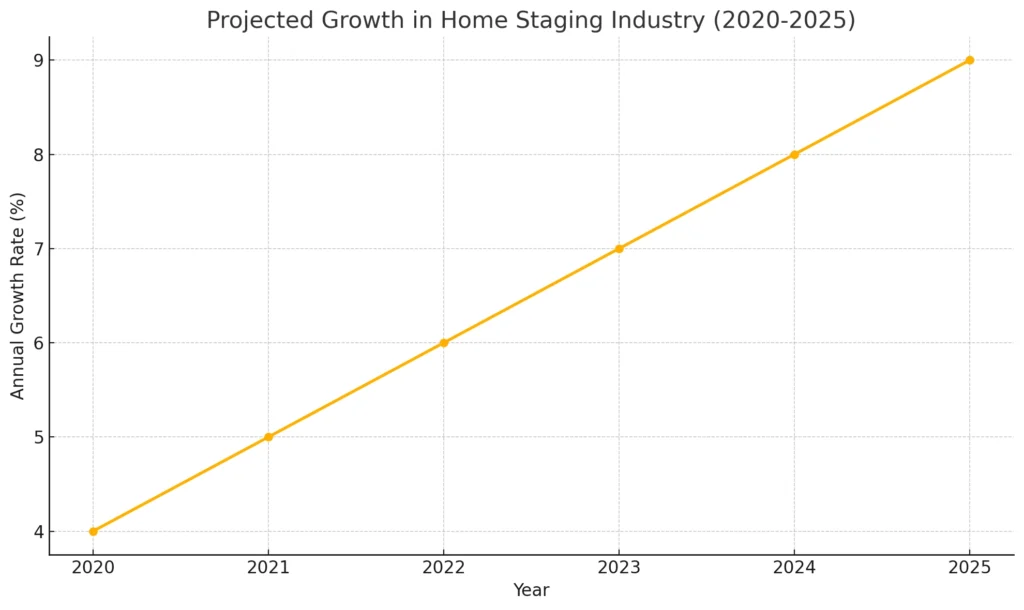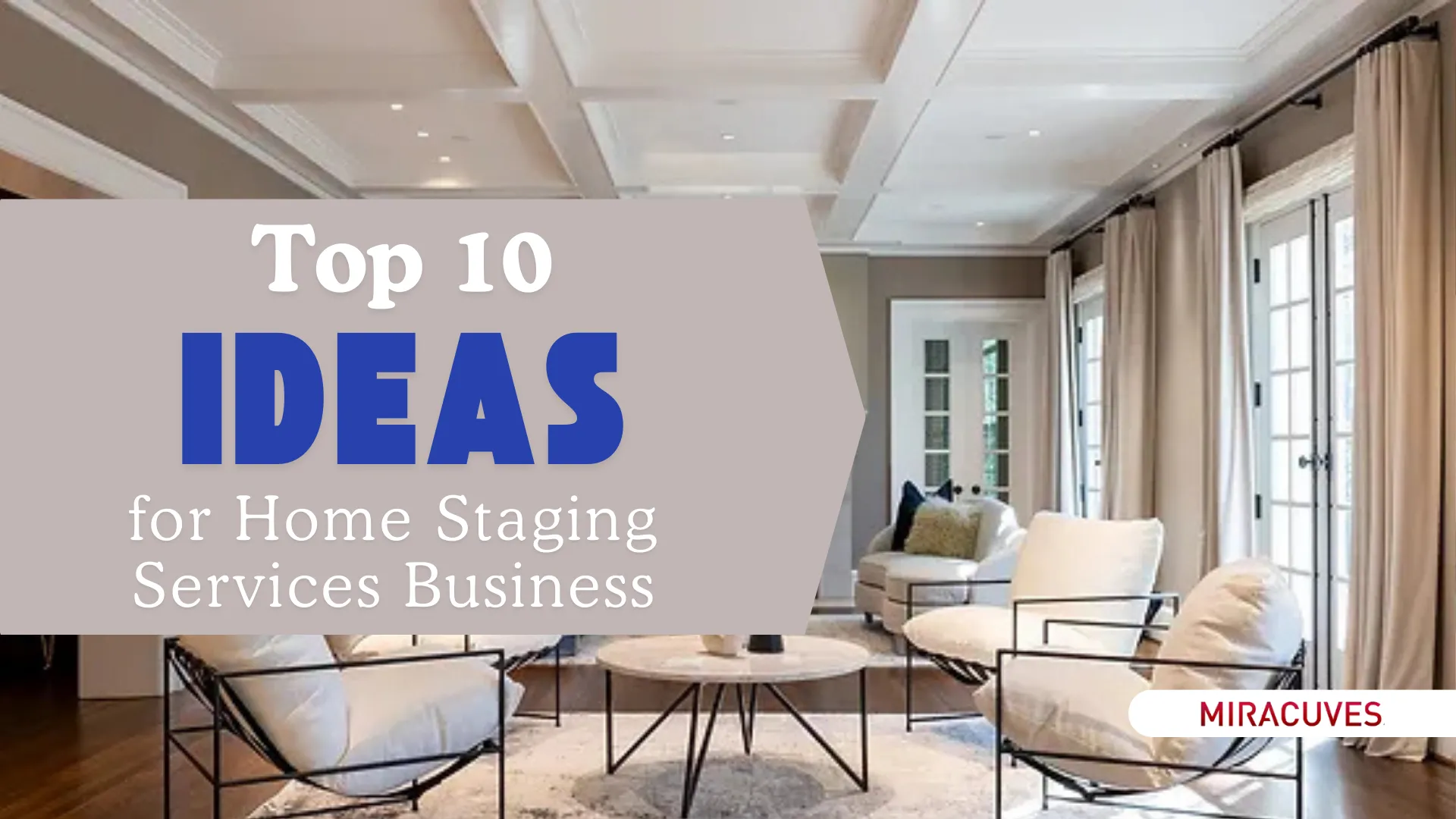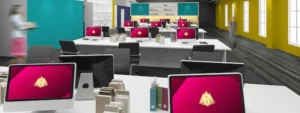In recent years, home staging has evolved from a niche service to an essential part of the real estate industry. With home buyers increasingly seeking ready-to-move-in properties that appeal to their personal tastes, home staging has become a powerful tool for enhancing a property’s visual appeal, often leading to faster sales and higher values. This surge in demand opens doors for innovative entrepreneurs to launch fresh, creative staging services that cater to modern market needs.
Whether you’re a seasoned decorator or a newcomer with an eye for design, starting a home staging business in 2024 offers an exciting blend of creativity and business opportunity. With the real estate market predicted to grow significantly, this industry presents substantial revenue potential, especially as more homeowners and real estate agents recognize the value of professional staging. Our guide will explore ten standout business ideas in home staging, detailing what you need to get started and how to position each idea for success.
| Metric | Statistic | Descrição |
|---|---|---|
| Market Size | $5 billion (2024) | The current estimated size of the home staging industry. |
| Annual Growth Rate | 8% | The projected annual growth rate for the home staging market, highlighting increasing demand. |
| Average Staging Cost per Home | $2,000 – $3,000 | The typical range homeowners or agents pay for staging services, showing revenue potential. |
| Percentage of Staged Homes Sold Faster | 85% | Homes with professional staging tend to sell significantly faster than non-staged properties. |
| Increase in Sale Price for Staged Homes | 5% – 10% | On average, staged homes can sell for 5-10% higher than their initial market value. |
| Popular Staging Trends | Minimalist, Eco-Friendly, Tech-Integrated | Current design trends shaping consumer expectations in home staging. |
Why Choose Home Staging?
Home staging has become one of the most sought-after services in real estate, driven by the simple fact that a well-staged home not only attracts more buyers but also maximizes the final sale price. In a competitive real estate market, sellers and agents alike are recognizing that staging is more than just decoration—it’s a strategic tool for making a lasting impression on potential buyers. With a projected 8% annual growth rate, the home staging industry is set to thrive, making it a lucrative field for entrepreneurs who want to blend creativity with business potential.

What makes home staging so appealing? First, it addresses a growing demand for visually appealing, “move-in ready” homes. Today’s buyers want properties that reflect current trends and allow them to envision their lives in the space from the moment they walk in. This heightened focus on the aesthetic value of homes has opened up endless opportunities for home staging services, from specialized decor for urban apartments to eco-friendly setups that resonate with sustainability-conscious buyers.
Starting a home staging business also comes with flexible entry options, making it accessible for various budgets and skill levels. Whether offering virtual consultations, hands-on staging for luxury properties, or niche services like seasonal decor, there’s room for everyone in this diverse industry. As consumer tastes evolve, new trends such as minimalist design and tech-integrated staging provide even more possibilities for unique, specialized services that can set your business apart.
Today’s buyers want properties that reflect current trends and allow them to envision their lives in the space from the moment they walk in.
Current Trends and Future Opportunities in Home Staging
| Trend/Technology | Descrição | Market Impact |
|---|---|---|
| Minimalist Staging | Emphasis on simplicity, neutral colors, and open spaces | Attracts younger buyers and aligns with modern design preferences |
| Eco-Friendly Staging | Use of sustainable materials, recycled decor, and energy-efficient items | Appeals to eco-conscious buyers and adds a unique selling point |
| Virtual Staging | Digital room designs for vacant or under-renovation properties | Cost-effective and convenient, increasing buyer engagement |
| Augmented Reality (AR) | Allows virtual walkthroughs of staged homes | Enhances remote viewing experience, attracting out-of-town buyers |
| Artificial Intelligence (AI) | Tools for personalized decor recommendations based on client needs | Offers tailored staging options, improving client satisfaction |
As the home staging industry continues to evolve, several key trends are shaping its future, creating fresh opportunities for entrepreneurs who are ready to meet the demands of modern homebuyers. One of the most notable trends is the shift towards minimalist staging, where sleek and simple designs allow the home itself to shine. This style, popular among younger buyers, focuses on open spaces, neutral color palettes, and clutter-free environments that feel both modern and timeless.
Another emerging trend is the push for eco-friendly and sustainable staging options. With growing awareness around environmental issues, buyers are increasingly interested in properties that reflect their values. Home staging businesses can cater to this demand by incorporating sustainable materials, energy-efficient appliances, and recycled decor items. This approach not only attracts eco-conscious clients but also gives staging businesses a unique selling point.
Virtual staging is another fast-growing trend, driven largely by the digital convenience that buyers now expect. By offering high-quality, digitally rendered room designs, staging professionals can help clients visualize potential transformations without the costs of physical staging. Virtual staging is especially appealing for properties that are vacant or under renovation, providing a cost-effective way to show a property’s potential in just a few clicks.
Looking to the future, technology will continue to play a pivotal role in home staging. From augmented reality (AR) that allows buyers to “walk through” staged homes online to artificial intelligence (AI) tools that generate tailored decor recommendations, the integration of tech can provide engaging, personalized experiences for clients.
Top 10 Ideas for Home Staging Business Startups
Starting a home staging business offers a variety of creative avenues, each tailored to meet specific needs and budgets within the real estate market. Here are ten innovative ideas to kickstart a successful home staging venture:
| Home Staging Idea | Estimated Startup Cost | Target Market | Profit Potential |
|---|---|---|---|
| Luxury Home Staging | High ($10,000 – $20,000) | Upscale property markets | High, premium fees |
| Virtual Staging Services | Low ($500 – $2,000) | Out-of-area buyers, vacant homes | Moderate, high volume |
| Eco-Friendly Staging | Medium ($5,000 – $10,000) | Eco-conscious buyers | High, unique niche |
| Seasonal and Holiday Staging | Low ($1,000 – $3,000) | Sellers during peak seasons | Moderate, seasonal demand |
| Occupied Home Staging | Low ($500 – $1,500) | Budget-conscious clients | Moderate, frequent demand |
| Themed Staging | Medium ($3,000 – $7,000) | Niche buyer groups | High, differentiates brand |
| Rental Staging Packages | Medium ($2,000 – $5,000) | Short-term rental properties | Moderate, ongoing demand |
| Small Space Staging | Low ($1,000 – $3,000) | Urban markets, small properties | Moderate, steady demand |
| Pet-Friendly Staging | Low ($1,000 – $2,500) | Pet-owning buyers | Moderate, niche appeal |
| New Construction Staging | High ($10,000 – $15,000) | Developers, new build markets | High, stable partnerships |
1. Luxury Home Staging
Provide high-end staging with premium furnishings and sophisticated designs, ideal for upscale real estate markets.
- Target Market: Luxury homebuyers, real estate agents in high-end markets
- Estimated Costs: High (premium furnishings, decor inventory)
- Startup Requirements: High-quality furniture and decor, connections with luxury real estate agents, design expertise
2. Virtual Staging Services
Offer digital staging using software to create realistic designs, a cost-effective solution for vacant properties.
- Target Market: Out-of-area buyers, real estate agents with vacant listings
- Estimated Costs: Low to moderate (staging software, digital assets)
- Startup Requirements: Staging software, digital design skills, high-quality images of properties
3. Eco-Friendly Staging
Focus on sustainable staging using recycled materials and eco-conscious decor, appealing to environmentally minded buyers.
- Target Market: Eco-conscious buyers, green real estate markets
- Estimated Costs: Moderate (sustainable materials, eco-friendly decor)
- Startup Requirements: Knowledge of sustainable products, low-VOC paints, partnerships with eco-friendly suppliers
4. Seasonal and Holiday Staging
Stage properties to match the current season or holidays, making homes feel warm and inviting during peak selling times.
- Target Market: Real estate agents with seasonal listings
- Estimated Costs: Low to moderate (seasonal decor, storage)
- Startup Requirements: Seasonal inventory, knowledge of market trends, adaptable decor solutions
5. Occupied Home Staging
Enhance decor in occupied homes by blending existing furnishings with added touches to elevate the property’s appeal.
- Target Market: Budget-conscious clients, occupied property sellers
- Estimated Costs: Low (minimal inventory required)
- Startup Requirements: Small selection of versatile decor items, staging expertise, strong communication skills
6. Themed Staging
Create unique staging themes to appeal to specific buyer demographics, like family-friendly or urban chic styles.
- Target Market: Niche buyers, clients with specific style preferences
- Estimated Costs: Moderate (themed decor and accessories)
- Startup Requirements: Inventory for various themes, design versatility, demographic research
7. Rental Staging Packages
Provide staging for short-term rentals to increase their appeal on platforms like Airbnb and attract more bookings.
- Target Market: Vacation rental owners, Airbnb hosts
- Estimated Costs: Moderate to high (furniture and decor rentals)
- Startup Requirements: Inventory for short-term rental needs, knowledge of vacation rental trends, flexible decor options
8. Small Space Staging
Specialize in staging compact spaces, focusing on maximizing limited square footage, especially in urban markets.
- Target Market: Apartment and condo owners, real estate agents in urban areas
- Estimated Costs: Low to moderate (small-space furniture, multifunctional decor)
- Startup Requirements: Small-scale furniture, expertise in space-saving design, understanding of urban market needs
9. Pet-Friendly Staging
Highlight pet-friendly features in homes to attract buyers who want spaces suited to their pets.
- Target Market: Pet owners, real estate agents catering to pet-friendly markets
- Estimated Costs: Low (pet-friendly decor, minimal investment)
- Startup Requirements: Pet-friendly decor, knowledge of pet-friendly home features, access to accessories like pet beds
10. New Construction Staging
Stage newly built homes to help buyers visualize the space fully furnished, often working directly with developers.
- Target Market: Construction companies, real estate developers
- Estimated Costs: High (furniture and decor for large spaces)
- Startup Requirements: High-quality, versatile staging inventory, connections with developers, large-scale staging experience
Real-World Examples
To truly understand the potential of a home staging business, it’s helpful to look at how others have succeeded in this field. Many startups have found their niche by innovating within the home staging industry, creating services that stand out and meet specific market needs.

For instance, a luxury staging company in Los Angeles has tapped into the high-end real estate market by curating bespoke furnishings that align with each property’s architecture. This approach has allowed them to charge premium fees while establishing a reputation as a go-to service for upscale properties. Their attention to detail and unique decor selections make properties more appealing to discerning buyers, leading to faster sales at higher prices.
On the other side of the spectrum, a small virtual staging business in New York offers affordable digital renderings for clients with limited budgets or vacant properties. With a low startup cost, this company has been able to achieve high-volume work by providing flexible, high-quality images that help buyers envision a property’s potential. This approach has proven popular among real estate agents looking for cost-effective solutions to showcase properties without physical staging.
Another example is a seasonal staging company in Denver, which focuses on creating cozy, inviting atmospheres during the winter and fresh, airy setups in the summer. This business adapts to seasonal trends, providing timely decor that enhances buyer interest depending on the time of year. Their targeted approach allows them to capture market attention and capitalize on peak selling times.
These examples show the diverse opportunities within home staging, where entrepreneurs can carve out a niche based on location, target audience, or unique services. Each of these companies demonstrates how identifying and focusing on specific market needs can lead to sustained success.
Mistakes to Avoid When Starting a Home Staging Business
Launching a home staging business is exciting, but avoiding common mistakes can make all the difference between a thriving enterprise and a struggling one. Here are some pitfalls to watch out for as you step into this creative industry.
| Common Mistake | Preventive Measure |
|---|---|
| Underestimating Initial Costs | Budget for a full inventory, including diverse decor and staging software. |
| Neglecting Market Research | Conduct local market research to understand trends and property types in your area. |
| Lacking a Defined Niche | Choose a niche (e.g., eco-friendly, luxury, or virtual staging) to differentiate your services. |
| Overlooking Digital Marketing | Invest in a website, social media, and SEO to build an online presence and attract clients. |
| Ignoring Client Communication | Maintain clear communication, provide updates, and request feedback to build trust with clients. |
1. Underestimating Initial Costs
Many newcomers assume they only need a few decor items to get started. However, high-quality staging often requires an extensive inventory, especially if you plan to cater to different styles or property sizes. Budgeting for initial investments in furniture, decor, and technology (like staging software) is crucial for sustainable growth.
2. Neglecting Market Research
Diving into the business without understanding your local market can lead to missed opportunities or services that don’t align with client needs. Researching local trends, popular design styles, and the types of properties in your area will allow you to tailor your services and target the right customers effectively.
3. Lacking a Defined Niche
Trying to appeal to every type of client can dilute your brand and make marketing efforts less effective. Identifying a niche—such as eco-friendly staging, luxury properties, or virtual staging—allows you to build expertise, gain credibility, and stand out in a competitive market.
4. Overlooking Digital Marketing
In today’s online world, a digital presence is essential. New businesses often overlook investing in a professional website, social media platforms, and SEO, all of which are crucial for attracting clients. Establishing an online presence and regularly sharing portfolio examples, design tips, and success stories will help build your brand and attract clients.
5. Ignoring Client Communication
Good communication can make or break a business relationship. It’s essential to keep clients updated throughout the staging process and to seek feedback afterward. Clear communication builds trust, reduces misunderstandings, and increases the likelihood of positive word-of-mouth referrals.
In today’s online world, a digital presence is essential for attracting clients.
Why Trust Miracuves Solutions for Your Next Project?
When it comes to launching a successful home staging business, having the right tools and support is essential. Miracuves Solutions understands the unique demands of startups, especially in creative industries like home staging. With a track record of delivering cost-effective, ready-made app solutions tailored to industry needs, Miracuves Solutions is dedicated to helping entrepreneurs build strong, efficient, and scalable businesses.
One of the biggest challenges in home staging startups is managing operations while focusing on design and customer service. Miracuves Solutions offers a suite of digital tools and applications that simplify these aspects, from client management to inventory tracking. By streamlining these tasks, you can concentrate on what you do best—creating beautiful, inspiring spaces for your clients.
With years of experience in developing solutions specifically designed for various industries, Miracuves Solutions brings expertise that’s hard to match. Their platform combines affordability with functionality, giving startups an edge without straining their budgets. Plus, the flexibility to scale as your business grows means you’ll have the support needed at every stage of your journey.
Choosing Miracuves Solutions means choosing a partner that’s invested in your success. From initial setup to long-term growth, Miracuves Solutions stands by to support you, allowing you to focus on making your mark in the home staging industry.
Conclusão
Starting a home staging business offers an exciting opportunity to turn creativity into profit, all while helping homeowners and real estate agents achieve better sales results. By exploring trends, selecting a niche, and avoiding common mistakes, you can build a strong foundation for a successful venture. Each of the ten innovative ideas presented here provides a pathway to enter this thriving industry, catering to a variety of market needs and client preferences.
Whether you choose to specialize in luxury homes, eco-friendly designs, or virtual staging, the potential for growth and fulfillment in this industry is immense. As you embark on this journey, remember that a well-researched strategy and a clear understanding of your market are keys to long-term success. So, take your passion for design, pair it with strategic planning, and start building a home staging business that stands out in today’s competitive landscape.
Perguntas frequentes
What is the typical startup cost for a home staging business?
Startup costs vary based on the services offered. Basic staging services may start at around $1,000, while high-end or niche services can reach $10,000 or more.
How can I find clients for my home staging business?
Begin by networking with local real estate agents, attending property events, and building a social media presence showcasing your work. Word-of-mouth referrals are also key in this industry.
What skills are needed to start a home staging business?
Strong design skills, an understanding of current trends, excellent customer service, and basic business management knowledge are essential for success in home staging.
Is it better to buy or rent furniture for staging?
This depends on your budget and frequency of staging. Renting is cost-effective for new businesses, while purchasing furniture may be better if you stage multiple properties regularly.
What are some popular trends in home staging right now?
Minimalist and eco-friendly designs are trending, along with virtual staging for vacant properties. Pet-friendly and seasonal staging are also gaining popularity.





























































